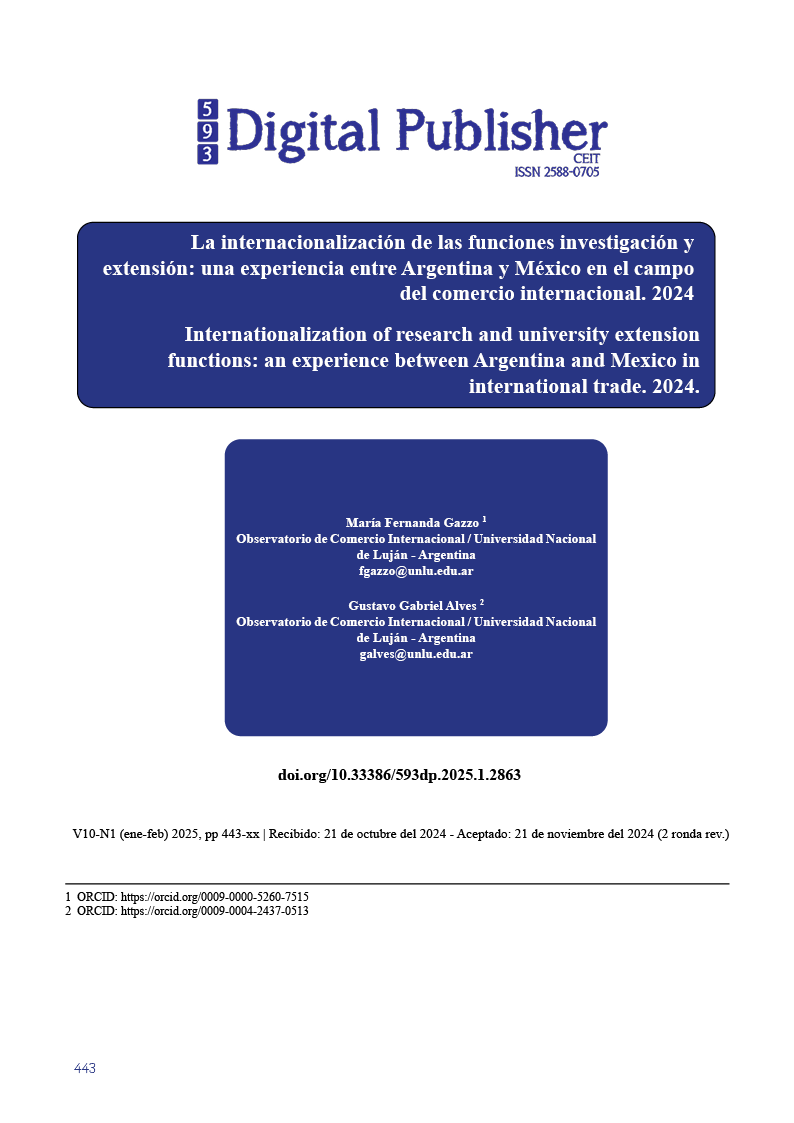Internationalization of research and university extension functions: an experience between Argentina and Mexico in international trade. 2024
Main Article Content
Abstract
This paper focuses on an inter-chairs/commissions experience on the internationalisation of research and outreach in two universities in Argentina and Mexico, specifically in international trade.
The main objective of this proposal was to bring together students and professors from both countries to foster collaboration and skills development in a broad intercultural environment. To this end, an international academic cooperation project was developed under the title Globalisation of Business through the support and development of the UN Sustainable Development Goals, using the Collaborative Online International Learning (COIL) methodology to promote intercultural and digital competences.
The proposal focused on the creation of a virtual space where students interacted and worked in collaborative activities, using digital tools such as Zoom, Padlet, Prezi and Canva both synchronously and asynchronously. The COVID-19 health contingency, as a recent precedent, boosted and strengthened the use of digital strategies in education.
Preliminary findings underline the need to move forward with inter-institutional agreements that strengthen higher education functions such as research and outreach.
The experience is invaluable in connecting theoretical knowledge with practical contexts, preparing students both in research and in exercising responsible leadership roles to face a complex professional environment.
Downloads
Article Details

This work is licensed under a Creative Commons Attribution-NonCommercial-ShareAlike 4.0 International License.
1. Derechos de autor
Las obras que se publican en 593 Digital Publisher CEIT están sujetas a los siguientes términos:
1.1. 593 Digital Publisher CEIT, conserva los derechos patrimoniales (copyright) de las obras publicadas, favorece y permite la reutilización de las mismas bajo la licencia Licencia Creative Commons 4.0 de Reconocimiento-NoComercial-CompartirIgual 4.0, por lo cual se pueden copiar, usar, difundir, transmitir y exponer públicamente, siempre que:
1.1.a. Se cite la autoría y fuente original de su publicación (revista, editorial, URL).
1.1.b. No se usen para fines comerciales u onerosos.
1.1.c. Se mencione la existencia y especificaciones de esta licencia de uso.
References
Asamblea General de Naciones Unidas (2015). Adopción de Agenda 2023 para el Desarrollo Sostenible. Disponible en: https://www.un.org/sustainabledevelopment/es/2015/09/la-asamblea-general-adopta-la-agenda-2030-para-el-desarrollo-sostenible/
Barroso, F. (2022). La metodología COIL como alternativa global para el desarrollo de competencias interculturales y digitales. En Avances Tecnológicos en la Educación y aprendizaje (p.p 54-65) Editorial Comunidad Internacional para el aprendizaje de la tecnología en el aprendizaje. Castilla La Mancha. España. Ed. CIATA. org – UNACAR.
Boaventura de Souza, S. (2009). Una epistemología del sur. La reinvención del conocimiento y la emancipación social. México. CLACSO – SIGLO XXI Editores.
Fernández, V. R., Trevignani, M. F. (2015). Cadenas globales de valor y desarrollo: Perspectivas críticas desde el sur global. Dados-Revista de Ciências Sociais, 58(2).
González, E. L. (2014). Las alternativas ciudadanas para otros mundos posibles: pensamiento y experiencias. Guadalajara. Ed. Iteso. Universidad Jesuita de Guadalajara.
Hernández Sampieri, R., Mendoza Torres, C. P. (2018). Metodología de la investigación: Las rutas cuantitativa, cualitativa y mixta (First edition). McGraw-Hill Education.



